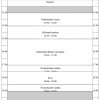Hello everyone,
Some months ago I started learning C++.
Unfortunately I haven't got many time to learn, so I'm stuck at the current chapter for a while.
I want to be a game developer in the future, so I have two questions:
1. Do I already know enough to start using Unreal Engine 4 to make games:
I learned and can use the following things: variables, functions, conditional statements, loops, arrays, vectors, pointers (only some basic things), classes and inheritance.
2. Would it be wise to start learning game development with an engine, or would it be better to learn the basics of game development first using an API like SFML.
3. If you advise to start with the engine, is it reachable to just make one or two small projects and then proceed with my book again, when I have more time?
Thanks.








